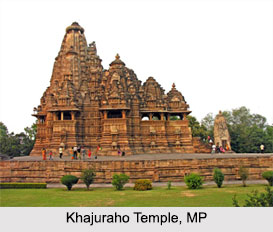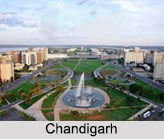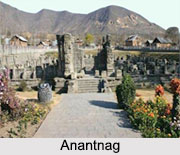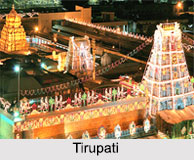Salar Jung I, the Diwan of Hyderabad, was both regenerator and architect of modern Hyderabad. He helped to change the Government`s whole attitude towards the Princely States by the policy which he as Diwan of the biggest Muslim State of India pursued during the Rebellion of 1857, and by the reforms that he effectuated. Salar Jung I in 1877 conferred territorial stability upon Hyderabad by settling the Berar question which arose from Lord Dalhousie`s treaty of 1853 which leased Berar to the British.
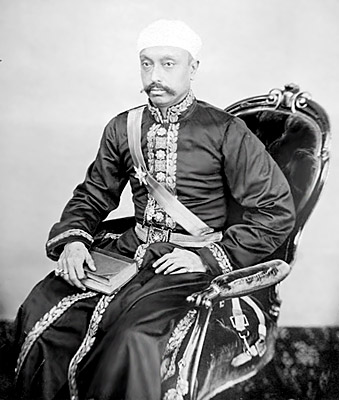 Sir Salar Jung or Mir Turab Ali was born in 1839 and was reckoned by the natives as Nawab Sahib. His contribution to make the state which he governed was his adept quality as a Diwan. Salar Jung was of pure Arab blood, being a descendant in the direct line from Khawja Avaiz Kami of Madina, a religious leader of great repute. Salar Jung`s ancestors on both sides had rendered loyal service to the State from the time of Nizamul-Mulk Asaf Jah I. His mother was a daughter of the first Shahab Jung, the son of Bahramud Dowla, and the grandson of Burhanul-Mulk, the Suba of Elichpur. The post of Diwan seems to have been hereditary in his family. It was held successively by his great grandfather Mir Alam, by his grandfather Munirul-Mulk and by his uncle Sirajul-Mulk. The obvious intelligence of Salar Jung impressed even those who met him only casually; and he was an excellent judge of character. He had studied Arabic, Persian and English, and much of his youth had been spent in the company of General Fraser, the British Resident at the Court of the Nizam from whom he acquired a taste for English Society.
Sir Salar Jung or Mir Turab Ali was born in 1839 and was reckoned by the natives as Nawab Sahib. His contribution to make the state which he governed was his adept quality as a Diwan. Salar Jung was of pure Arab blood, being a descendant in the direct line from Khawja Avaiz Kami of Madina, a religious leader of great repute. Salar Jung`s ancestors on both sides had rendered loyal service to the State from the time of Nizamul-Mulk Asaf Jah I. His mother was a daughter of the first Shahab Jung, the son of Bahramud Dowla, and the grandson of Burhanul-Mulk, the Suba of Elichpur. The post of Diwan seems to have been hereditary in his family. It was held successively by his great grandfather Mir Alam, by his grandfather Munirul-Mulk and by his uncle Sirajul-Mulk. The obvious intelligence of Salar Jung impressed even those who met him only casually; and he was an excellent judge of character. He had studied Arabic, Persian and English, and much of his youth had been spent in the company of General Fraser, the British Resident at the Court of the Nizam from whom he acquired a taste for English Society.
Sir Salar Jung knew that what remained to the Nizam could only be preserved by proving that Indian statesmen could address themselves to the task of government and regeneration with as much skill and success as the British rulers who surrounded them. Accord-ingly, he devoted his life to making the Nizam`s dominions a model State. He lived long enough to see the Deccan restored to prosperity and settled order, and the relations between the Indian States and the British Government firmly established on the basis of mutual respect and goodwill. Indian rulers had now learned that their independence was secure so long as their government was just and stable; and that as the British did not desire annexation it therefore rested with the rulers themselves to avoid it. Sir Salar Jung typified this prudent policy, and became its most conspicuous exponent. He did as much as any man to save the Indian States from absorption, since his untiring labours for the reorganisation of the Nizam"s dominions contributed substantially to halting the policy of annexation and establishing the state`s right to administrative independence. More-over, his endeavours in the more serious matters formerly in dispute between the Nizam and the Supreme Government were in great measure adjusted. And there was a sincere disposition on the part of the British Government to treat with Hyderabad on its rightful international footing.
At the beginning of the nineteenth century Hyderabad was the largest of the States ruled by the Native Princes in India. The Nizams were always considered to be heads of Indian Islam, tracing their ancestry from a family of the highest antiquity and importance directly descended from the first Khalif Abu Bakar, the successor of the Prophet. After a long line of intervening generations the direct ancestor of the Nizams was a Turkoman Chief, Ghazi-ud-din, one of the greatest of the Generals of the Emperor Aurangzeb by whom the States of Bujapur and Golconda were conquered and Deccan became a dependency of the Mughal Empire. Ghazi-ud-din`s son Qamarud-din Khan, Nizamul Mulk Asaf Jah I, established himself as an independent ruler in the Deccan, though still acknow-ledging nominal allegiance to the Mughal Emperor. At the time of Salar Jung`s assumption of the office of diwan, the Fourth Nizam, Nawab Nasarud Dowla, was on the Musnad of Hyderabad. Judged by the criteria of revenue and the number of his subjects he was indeed a much greater Prince than the Amir of Bukhara who was termed the head of Islam in central Asia, or the Sherif of Morocco who could probably have contested the legal right of the Sultan of Turkey to the Khilafat.
At a certain point the disorders in Hyderabad got the attention of the British authorities, who were concerned for the security of their own areas, which encircled the Nizam`s dominions on all sides. It was at this critical juncture that Salar Jung, a youth of twenty-four years, was appointed diwan by the Fourth Nizam, Nawab Nasarud Dowla, on 30 May 1853 only three days after the death of his uncle, the Diwan Nawab Sirajul-Mulk, and within ten days of the Cession of Berar to the British (21 May 1853).
Salar Jung had the reputation of being the most Europeanised of all the leading Indian statesmen of his time. Dinkar Rao of Gwalior, Kirpa Ram of Jammu and more specially Jung Bahadur of Nepal were typically Indian in their methods of administration. Even Salar Jung`s great contempor-ary, Madhava Rao of Baroda, though Anglicised, was thoroughly Indian in his outlook and, if left on his own, would have impressed his critics by his traditional Indian methods of tackling the problems of administration. Sir Salar Jung`s own reasons for using the pattern of British rules and regulations to improve the Hyderabad administration were twofold. First, he realised that laws framed by the English were not the mere suggestions of one or two persons, but were based on the joint wisdom and experience of several, and were only adopted after enquiry into the history, customs and religion of the people concerned with careful regard to their existing practices and habits. Secondly, he perceived that there was really no alternative course, for the Nizam`s country was surrounded by the British and if a different system were to be adopted, it would be of no advantage to Hyderabad, while the British authorities would have constant cause for criticism. At the same time, Sir Salar Jung was quite clear in his mind that any British rules or regulations which transgressed Muslim law would be wholly unsuitable for the conditions prevailing in Hyderabad.
Soon after his assumption of office, he had accepted the Diwani on the advice of and indeed under pressure from his friends, young Salar Jung began in earnest to extricate the Nizam`s State from its various embarrassments. He submitted a comprehensive scheme of reform, and through the intercession of some favourite courtiers it was approved by the Nizam, Nawab Nasarud Dowla.
Moreover, during the tenure of Sir Salar Jung, the administration was carried out in a peaceful and progressive manner. He followed the British way of collecting revenues and revenue settlements, which was basically borrowed extensively from the land settlement of Akbar`s times. During the period of Salar Jung, no regular account of the revenue of the country could be obtained when he first took over charge of the admin-istration. No set of rules or regulations existed for the guidance of revenue officers. A lump sum for each village was taken as the basis of assessment, without regard to the area and fertility of each separate field or to the fairness or unfairness of the demand made on each cultivator. Further, neither were Jamabandi returns prepared, nor were monthly statements of receipts, and payments still outstanding transmitted to headquarters. But the weakness of Sir Salar Jung`s administration lay in the field of finance. He never wholly overcame the financial instability which had faced him from the moment when he became Diwan on the death of his uncle Nawab Sirajul Mulk; all he could do was to hold it at bay, so that on his own death financial problems emerged in an aggravated form because the recurrent of peculation had found two new fields of operation during the latter part of his ministry. The first was the patriotic drive for the restoration of the Berars and the second the Hyderabad Railway scheme. Nor were these enterprises the only sources of wastage; the re-emergence of financial instability was closely connected with the second ascendancy of the sinister Palmer influence over the Hyderabad administration. The Peshkar, Raja Narendra Pershad, a grandson of Raja Chandu Lai, William Palmer`s notorious coadjutor, became senior administrator in succession to Sir Salar Jung, with Laik Ali as his junior.
Sir Salar Jung instituted courts of justice at Hyderabad, fabricated and recreated irrigation works, organised the police force, and established schools. Though Salar Jung was not that successful in his rule, his personal merits were always reckoned with reverence. His death was unfortunate as he died of cholera on the 8th of February 1883 in Hyderabad.

